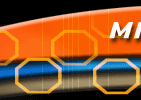




Defining life
|
What is life and how can you tell if something is alive? Many people have thought about the answers and most agree that there are seven characteristics or features of living things that make them different from non-living things. To be alive, all must apply. |
|
Standard
biology textbooks often offer the following seven characteristics
to define life:  Movement Movement
 Respiration Respiration Sensitivity Sensitivity
 Growth Growth Reproduction Reproduction Excretion Excretion
 Nutrition Nutrition
|
|
The respected biologist Edward Mayr elaborated on this in his book, The Growth of Biological Thought (1982). He suggested the following eight points necessary for consideration in recognizing living systems and entities. In simplified form his points were as follows:
|
|
In the light of recent discoveries, the very different environmental conditions found in space as compared with Earth, it is necessary to broaden and change some of the definitions. Life must be or have: To be alive an organism must possess all seven of these features. Crystals
have some of these abilities, and fire others, but neither could
be considered as living. Robots can be built to have yet more
of the features of life, but they cannot grow physically, evolve
or reproduce, so fail the life test on three counts. |
![]()
Who
Wrote The Book of Life? Picking Up Where D'Arcy Thompson Left Off
What
Is Life?
Life:
What Exactly Is It?- Discussion with Dr Stanley Miller
The
Sagan Criteria for Life Revisited
Puzzles
of Life
The
Seattle Times, Today's Top Stories: Microbe unlike life as we know it
Go
to
Home
| Space Station
| Mars | Rainforest
© 1999 Satellite Events Enterprises Inc.
